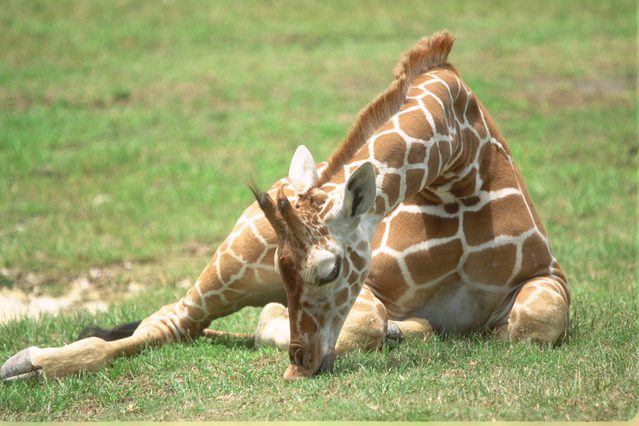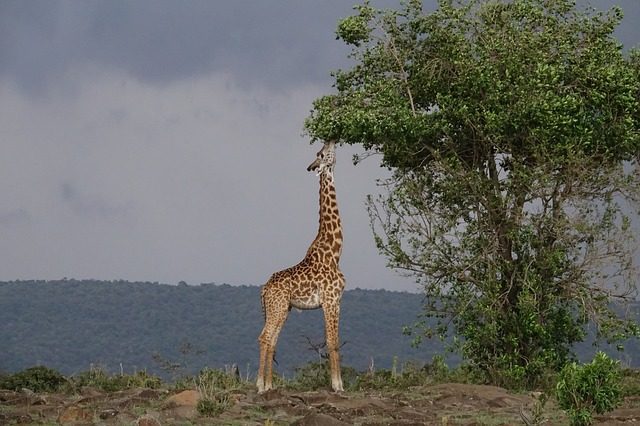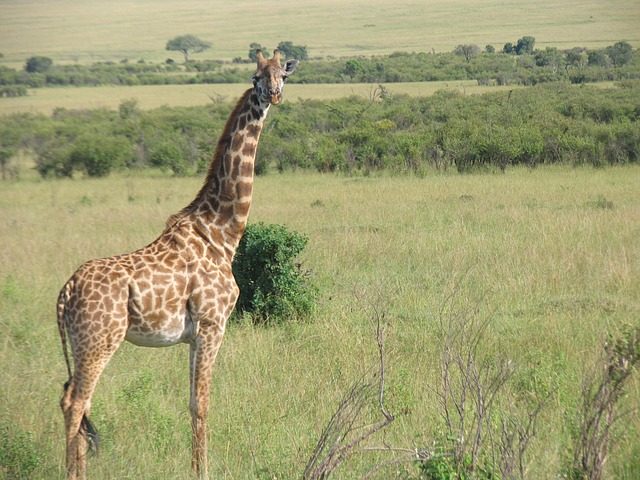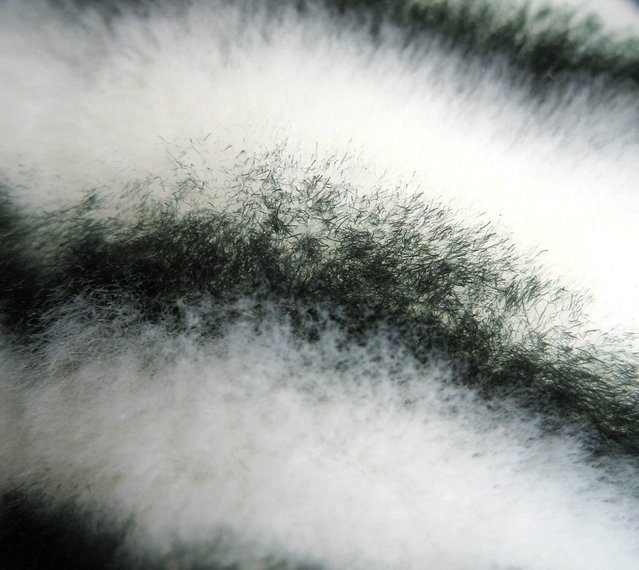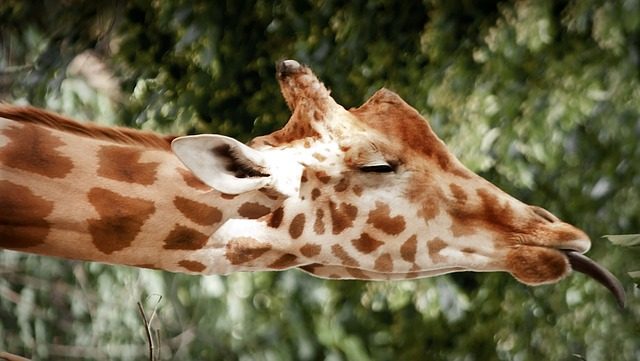African Giraffes’ Sleeping Patterns
Data
Not much is known about the sleeping patterns of giraffes especially those that are in the wild. Therefore, biologists have conducted close observations in environments such as zoological gardens where it is possible to observe these animals in semi-wild conditions. Besides, modern technology has been used for continuous observation of giraffes with light-sensitive cameras in zoos, so that they are undisturbed by additional light or by the observer. Nevertheless, the trustworthiness of such data is questionable because they are based on observations of just a few individuals. The limited data available reveals that several factors can contribute to the lack of enough sleep reported for giraffes.
1) Constitutional variables
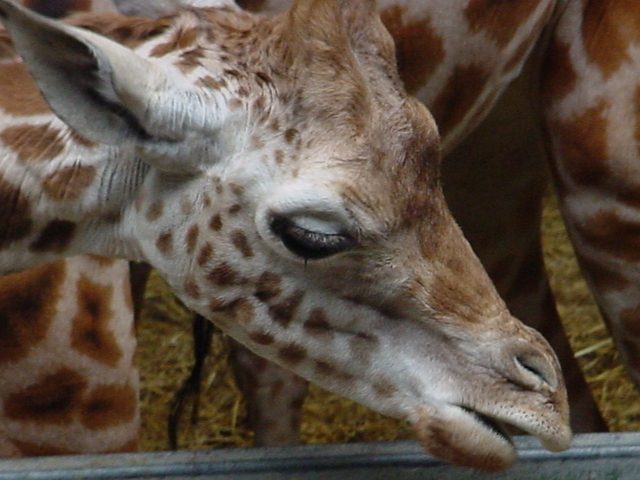
African Giraffes’ Sleeping Patterns
The constitutional variables which best correlate with daily sleep quotas of giraffes are the brain’s weight, body mass index, metabolic rate, and predation risk rate. Sleep decreases as the brain weight, metabolic rate, or body mass increase. Interestingly, correlations between the danger of predation and the amount of sleep showed that undomesticated giraffes exhibit little sleep, whereas those that face small predation risk i.e., giraffes in captivity, exhibit more sleep. Hence, the predation risk rate is found to be a better predictor of sleep time than metabolic rate or brain and body weight. Nevertheless, giraffes can further reduce their sleep when conditions are adverse.
2) Constant interruptions
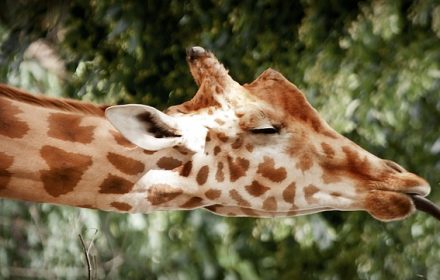 External disturbances can be a major reason for the less amount of sleep reported for giraffes. That is why we don’t see them sleeping in a zoological garden where there are constant interruptions by the public. Also, the observer’s presence influences the observations at night, when the animals are likely to be sleeping.
External disturbances can be a major reason for the less amount of sleep reported for giraffes. That is why we don’t see them sleeping in a zoological garden where there are constant interruptions by the public. Also, the observer’s presence influences the observations at night, when the animals are likely to be sleeping.
3) Vegetarian diet
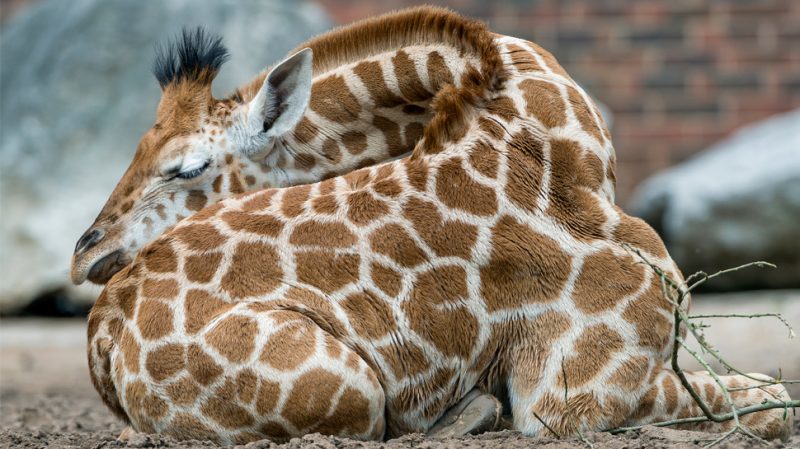 Another factor contributing to the short sleep in giraffes is the vegetarian diet which necessitates huge amounts of food intake. A large part of the day is spent in feeding. Nocturnal waking behavior also consists largely of feeding. It implies that giraffes in the wild who are in danger of predation must choose between the need for avoidance of predators and feeding. However, EEG recordings in herbivores have shown that sleep and rumination are not exclusive behaviors.
Another factor contributing to the short sleep in giraffes is the vegetarian diet which necessitates huge amounts of food intake. A large part of the day is spent in feeding. Nocturnal waking behavior also consists largely of feeding. It implies that giraffes in the wild who are in danger of predation must choose between the need for avoidance of predators and feeding. However, EEG recordings in herbivores have shown that sleep and rumination are not exclusive behaviors.
Sleeping postures
It has been shown that giraffes can sleep either in a standing or recumbent posture. In the standing posture, they are motionless, and the neck is at a narrow-angle. The transition from standing to recumbency is gradual and the transition to recumbent sleep from recumbent wakefulness could occur several times before paradoxical sleep could be seen. In recumbency, giraffes could be either sleeping or awake. The posture consists of legs folded under the neck. The neck is bent forward at an angle less vertical than when awake. And they rest the head immobile on the rear leg. During this time twitching of the neck and ears is apparent. Giraffes have a preferred sleeping site, which they would approach many times before finally taking the recumbent sleeping posture.
Awkward body parts
Possibly the long neck and legs contribute to a difficult recumbent sleeping position which does not allow quick running as a response to external danger. The difficulties in rising from the ground could also contribute to the capacity to sleep in a standing posture and the short duration of sleep. In summary, the short duration of sleep in giraffes may be a result of larger predatory risk, however, this does not explain the negative correlation with brain weight or body size.
Reference
Tobler, Irene & Schwierin, Barbara. (1996). Behavioral sleep in the giraffe (Giraffa Camelopardalis) in a zoological garden. Journal of sleep research. 5. 21-32. 10.1046/j.1365-2869.1996.00010.x.
5 Frequently Asked Questions About The Sleeping Patterns Of Giraffes
For a custom-made safari, please fill out the following form or simply email us on safaris@safari-center.com

